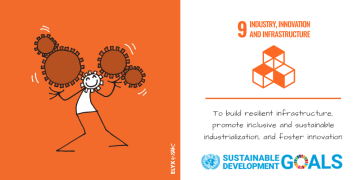Sustainable Energy: opportunities for co-creation and cooperation

Organised by SANORD special interest group for SDG9 and the FAPI network
OPEN FOR ALL!
>>Join the webinar here (Zoom link)
you can also copy the link on your browser https://utu.zoom.us/j/65904327347
Climate change, economic and population growth has brought us to the situation where the world needs to invest more to the sustainable energy transition to achieve the Sustainable Energy Goals. Many countries already have ambitions plans for this. Renewable energy has the potential to provide electricity to millions Africans currently deprived of it. It will create jobs and stimulate industrialisation. What is the role of higher education and research in this process? How cooperation between South and North can boost this development?
12.30–12.40 Welcome words
Umesh Bawa, Director of the SANORD Central Office, University of the Western Cape
12.40–12.50 Introduction of SANORD special interest group SDG 9 and FAPI
Professor Jussi S. Jauhiainen, academic coordinator of FAPI, University of Turku (UTU)
Prof. Jussi Jauhiainen is a Professor in Department of Geography and Geology, University of Turku. His expertise includes sustainability-oriented innovations in Africa, the Metaverse and generative AI as well as scientific collaboration between Nordic Countries and Africa. He is also the academic coordinator of the Finland – Africa Platform of Innovation.
12.50–13.15 Futures studies and foresight and renewable energy education and training
Professor Juha Kaskinen, University of Turku
Question of renewable energy is global, national, regional as well as local dilemma. In order to make the real energy production and consumption shift to green energy system we need future orientated education and training with interdisciplinary approach.
Prof. Juha Kaskinen is a Director of Finland Futures Research Centre (FFRC). His expertise includes academic futures studies and foresight, industrial and regional policy, environmental issues and sustainable development. Finland Futures Research Centre (FFRC) works with a transdisciplinary approach in an international environment. The cornerstones of our activities are on developing academic futures studies, critical interdisciplinary research, high quality education, strategic and business foresight and insightfully produced futures knowledge.
13.15–13.40 The role of mineral resources to the renewable energy transition
Professor Benjamin Mapani, Mining Engineering; Namibia University of Science and Technology
The talk of Professor Benjamin Mapani will focus on how mining can drive the decarbonisation process and contribute to the mitigation of climate change effects. The focus is on responsible and striving towards carbon neutral mining and also how sourcing critical minerals that help reduce GHG emissions technologies can be adopted.
Prof. Benjamin Mapani is currently employed as a Professor in the Department of Mining and Process Engineering at the Namibia University of Science and Technology, in Windhoek. Prof. After degree studies the University of Zambia in Mineral Sciences and Master’s degree in Geology (D.E.S.S.) in 1990 at Ecole de Mines, Nancy, France in 1991, he proceeded for his Ph.D., at the University of Melbourne, Australia, completing it in 1994. He returned to Academia and has since worked for the Universities of Zambia (1989–1997), Zimbabwe (1998–2002), University of Namibia (2003-2019) and currently the Namibia University of Science and Technology (2020–present). Prof. Benjamin Mapani is also one of the founding members of the Geology Department at the University of Namibia.
13.40–14.05 The efficiency of solar energy for sustainable electrification
PhD candidate Fernando Mucomole, CPE – Centre of Research in Energy, Eduardo Mondlane University
Approximately 733 million individuals across the globe lack access to electricity, with 80% residing in rural areas, primarily concentrated in sub-Saharan Africa. Familiarity with the availability and dissemination of photovoltaic solar energy technology could enhance the effectiveness of community electrification efforts, thereby expediting the achievement of the Sustainable Development Goals (SDGs) for global electrification by 2030 and the widespread adoption of clean energy projected for 2050.
PhD candidate Fernando Mucomole,an esteemed faculty member at Eduardo Mondlane University specializes in Renewable Energy and Theoretical Physics in his research endeavors. He exhibits a profound fascination for developing adaptable energy resource variability models through the implementation of artificial intelligence techniques. You can find more information about his scholarly contributions here. Apart from his academic pursuits, Fernando is also an accomplished guitarist and soloist. He dedicates his time to live music performances, engaging in sports activities, and indulging in the tranquility of rural camping.
14.05–14.30 The energy transition – solutions and challenges for sustainable energy systems
Associate Professor Marcus Lundgren; Department of Energy Sciences, Lund University
The need for climate-friendly, affordable, and reliable energy has never been more relevant. In Africa and Sweden, ongoing transitions aim to meet these goals, each facing unique challenges. Hydrogen and biofuels are promising components in achieving sustainable energy systems, offering benefits for energy storage and dispatchable power, especially in situations where battery solutions may not be applicable. Ongoing experimental research projects in Sweden and Mozambique will presented, but also initiatives in energy system modelling related to both.
Associate Professor Marcus Lundgren has a background in experimental research on internal combustion engines with Swedish truck industry, currently primarily using hydrogen as fuel. Later the scope has diversified into experimental work on energy systems in rural Mozambique. In order to advance his research, energy system modeling (TIMES) is of interest to allow comprehensive systems analysis and understanding of the utilization of sustainable energy sources.
14.30–15.00 Discussions
Chair Prof. Jussi Jauhiainen

